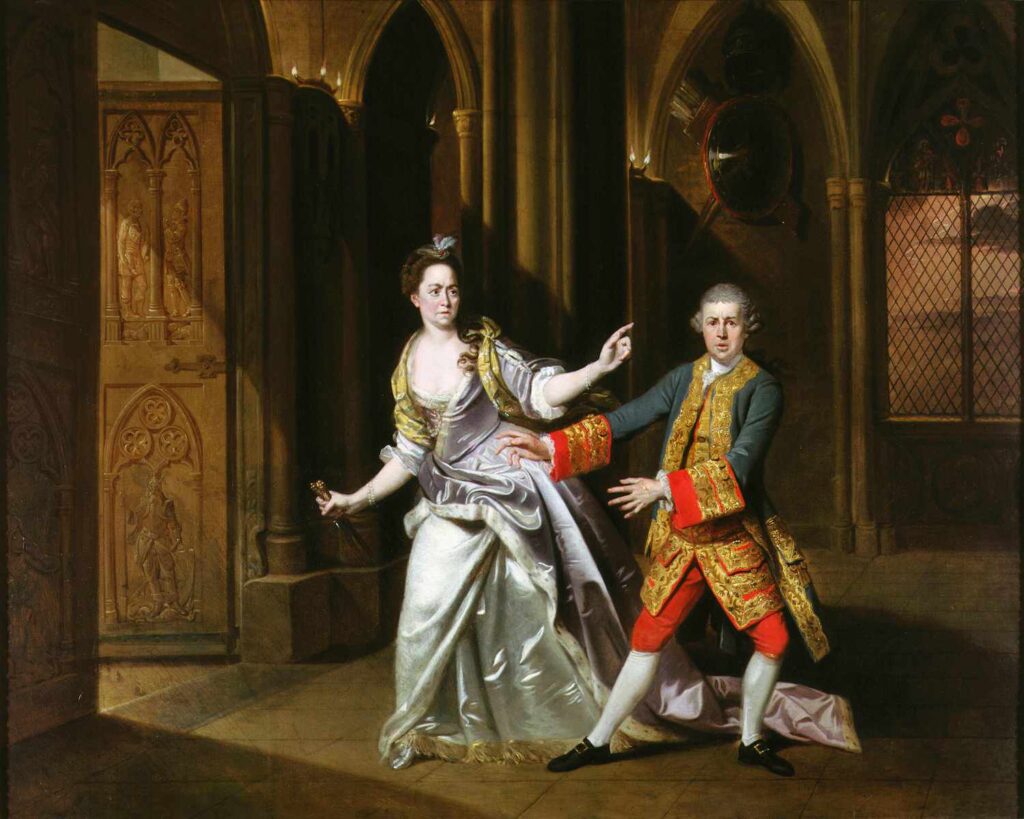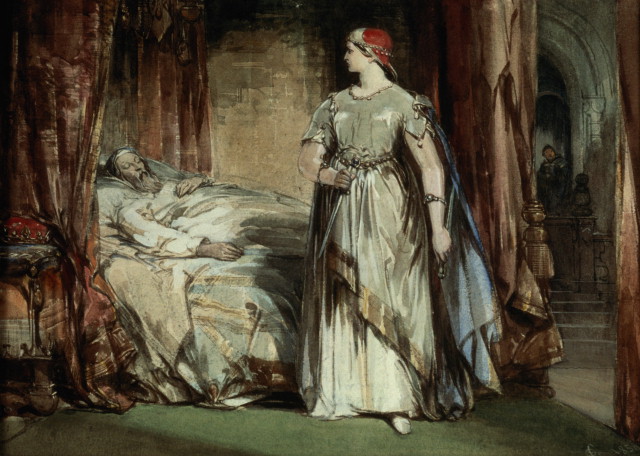Lady Macbeth in Shakespeare’s “Macbeth” is depicted as a powerful character through her manipulation, determination, and commanding language. She skillfully manipulates her husband, Macbeth, persuading him to commit regicide in pursuit of power. Lady Macbeth’s ambition is relentless, and she takes a proactive role in planning and executing the murder of King Duncan. Her forceful and commanding language, particularly in invoking the spirits to “unsex” her, illustrates her intensity in seeking power. Lady Macbeth’s ability to exploit Macbeth’s vulnerabilities, maintain composure, and deceive others adds layers to her portrayal of power.
While her strength is evident, the play also delves into the psychological consequences of her actions, as guilt and madness eventually take their toll. Lady Macbeth’s early portrayal showcases her as a forceful and influential character in the ruthless pursuit of power.
How does Lady Macbeth manipulate to assert power?

Lady Macbeth is a complex and intriguing character in William Shakespeare’s play “Macbeth.” Her manipulation to assert power is evident through various strategies and tactics. Here are some key ways in which Lady Macbeth manipulates to assert power:
Questioning Macbeth’s masculinity
Lady Macbeth challenges Macbeth’s manhood when he hesitates to carry out the murder of King Duncan. She questions his courage and masculinity, using language that suggests he is not a real man unless he acts decisively. This manipulation preys on Macbeth’s insecurities and desire to prove himself.
Emotional manipulation
Lady Macbeth skillfully uses emotional tactics to play on Macbeth’s love for her and his ambition. She questions his love and commitment, implying that only a truly loving and ambitious man would go through with the murder. By appealing to his emotions, she manipulates him into taking action.
Psychological manipulation
Lady Macbeth employs psychological tactics to break down Macbeth’s resistance. She urges him to “screw [his] courage to the sticking place” and manipulates his mind by convincing him that the murder is the only way to fulfill their ambitions. She exploits his mental vulnerabilities, leading him to commit the crime.
Planning and organization
Lady Macbeth takes charge of the practical aspects of the murder plot. She organizes the details, instructing Macbeth on the specific steps to be taken, and ensuring that the plan is executed smoothly. By assuming control over the logistical aspects, she asserts her influence and authority.
Public manipulation
Lady Macbeth also uses her charm and social skills to manipulate others. During the banquet scene, she works to divert suspicion away from Macbeth and to maintain appearances. She manipulates the guests by downplaying Macbeth’s strange behavior, ensuring that their power and status remain intact.
Isolation and control
Lady Macbeth isolates Macbeth from others who might dissuade him from pursuing his ambitions. She strategically keeps him away from those who might offer different perspectives or advice, maintaining control over the information he receives and reinforcing her influence.
Cunning persuasion
Lady Macbeth is adept at persuading Macbeth through cunning and rhetoric. She uses persuasive language and logical arguments to convince him that the murder is not only necessary but also morally justifiable. Her eloquence and persuasion skills contribute to her ability to manipulate him.
In summary, Lady Macbeth employs a combination of emotional, psychological, and strategic manipulation to assert power over her husband, Macbeth. Her influence over him is a crucial element in the unfolding tragedy of the play.
What’s Lady Macbeth’s role of ambition and ruthlessness in portraying power?
Lady Macbeth’s ambition and ruthlessness play significant roles in her portrayal of power in Shakespeare’s “Macbeth.” Here’s how these traits contribute to her character and the dynamics of power in the play
Driving Ambition
Personal Ambition
Lady Macbeth is ambitious not only for herself but also for her husband. She desires the throne and sees Macbeth’s rise to power as a means to fulfill her own aspirations. Her ambition is a driving force that propels the plot forward.
Ambition as a Catalyst
Lady Macbeth’s ambitious nature serves as a catalyst for Macbeth’s own ambition. She pushes him to pursue the crown and stops at nothing to achieve it. Her relentless ambition fuels Macbeth’s actions and contributes to the tragic events that unfold.
Ruthlessness
Encouraging Violence
Lady Macbeth is ruthless in her determination to achieve power. She urges Macbeth to commit murder to secure the throne, showing a willingness to resort to extreme measures. Her lack of moral restraint is a manifestation of her ruthless nature.
Suppressing Guilt
Lady Macbeth’s ruthlessness is evident in her ability to suppress feelings of guilt and remorse. After the murder of Duncan, she encourages Macbeth to put on a facade of normalcy and dismiss any pangs of conscience. Her emotional resilience contributes to the maintenance of power.
Manipulation and Control
Using Ambition as Leverage
Lady Macbeth skillfully uses Macbeth’s ambition as a lever to manipulate and control him. By questioning his manhood and love for her, she compels him to fulfill her own ambitious desires. This manipulation allows her to assert influence over his decisions and actions.
Ruthless Guidance
Lady Macbeth guides and directs Macbeth with a ruthless determination to achieve their goals. Her role extends beyond mere manipulation; she actively participates in planning and executing the murder. Her hands-on approach underscores her ruthless commitment to the pursuit of power.
Consequences of Unbridled Ambition
Downfall
Lady Macbeth’s unchecked ambition, combined with her ruthlessness, eventually leads to her mental deterioration. The guilt and psychological burden associated with the crimes committed in the pursuit of power contribute to her descent into madness. This showcases the consequences of unbridled ambition.
In essence, Lady Macbeth’s ambition and ruthlessness are integral to the exploration of power dynamics in “Macbeth.” Her character exemplifies how unrestrained ambition, when coupled with a willingness to be ruthless, can drive individuals to commit heinous acts and ultimately lead to their downfall. Her portrayal serves as a cautionary tale about the corrupting influence of power and the moral compromises made in its pursuit.
How does Lady Macbeth demonstrate determination and control in “Macbeth”?
Lady Macbeth demonstrates determination and control through her actions, words, and manipulation in Shakespeare’s “Macbeth.” Here are several ways in which these traits are evident in her character:
Manipulation of Macbeth
Lady Macbeth actively manipulates her husband, Macbeth, to achieve their shared ambitions. She questions his masculinity, challenges his love for her, and employs various psychological tactics to control his actions. Her manipulation is a manifestation of her determination to see their plans through.
Strategic Planning
Lady Macbeth takes charge of the practical aspects of the murder plot. She devises a detailed plan, instructing Macbeth on the specific steps to be taken and ensuring that every detail is accounted for. This level of strategic planning demonstrates her determination and control over the execution of their ambitious goals.
Emotional Suppression
Lady Macbeth suppresses her own emotions, particularly guilt and remorse, in order to maintain control. After the murder of Duncan, she advises Macbeth to “look like th’ innocent flower, but be the serpent under ’t,” urging him to conceal their nefarious deeds. Her ability to mask her true emotions illustrates her determination to keep their secret and exert control over the situation.
Taking Initiative
Lady Macbeth does not passively wait for things to happen; instead, she takes the initiative to propel their plans forward. She reads Macbeth’s letter about the witches’ prophecies and immediately devises a plan to seize power. Her proactive approach underscores her determination to shape their destiny.
Commanding Language
Lady Macbeth’s language is commanding and assertive. She uses imperative sentences and forceful rhetoric to convey her determination and control over Macbeth. For example, in her famous soliloquy in Act 1, Scene 5, she calls on the spirits to “unsex” her and fill her with cruelty, showcasing her unwavering determination to achieve her goals.
Maintaining Appearances
Even in the face of mounting suspicion and guilt, Lady Macbeth maintains control by ensuring that outward appearances are not compromised. During the banquet scene, she skillfully deflects attention from Macbeth’s strange behavior, managing to keep up the appearance of normalcy. This ability to control public perception is crucial for maintaining their position.
Leadership Role
Lady Macbeth assumes a leadership role in their relationship. She directs Macbeth, provides guidance, and actively participates in the execution of their plans. Her determination to lead and control the unfolding events highlights her strong and assertive character.
Despite her determination and control, Lady Macbeth’s character also experiences a psychological unraveling as the consequences of their actions weigh heavily on her conscience. Her eventual descent into madness serves as a poignant commentary on the limits of control and the toll of unrestrained ambition.
FAQ’s
What is the character of Lady Macbeth in the play “Macbeth”?
Lady Macbeth is a complex and ambitious character, driven by an unrelenting desire for power and success.
Is Lady Macbeth more powerful than Macbeth?
Lady Macbeth exerts significant influence over Macbeth, especially in manipulating him to fulfill their ambitions, making her a powerful force in the play.
Why is Lady Macbeth stronger than Macbeth?
Lady Macbeth’s strength lies in her determination, strategic planning, and ability to manipulate situations, showcasing a resolute nature that surpasses Macbeth’s.
Who is stronger, Lady Macbeth or Macbeth?
While both characters exhibit strength, Lady Macbeth’s strength manifests in her assertive manipulation and strategic planning, making her, in some aspects, stronger than Macbeth.
Is Lady Macbeth a strong or weak character?
Lady Macbeth is a strong character, demonstrating strength through her ambition, determination, and ability to influence those around her.
Who is a strong and manipulative character in Macbeth?
Lady Macbeth emerges as a strong and manipulative character in “Macbeth,” employing psychological tactics to achieve her ambitious goals.
Final Words
Lady Macbeth is a powerful and complex character in Shakespeare’s “Macbeth.” Her manipulation, ambition, and determination contribute to her portrayal as a strong and influential figure. However, as the story unfolds, we witness a tragic transformation in her character, as guilt takes its toll on her mental state.
The enduring portrayal of Lady Macbeth as a powerful woman adds depth to the narrative, highlighting the consequences of unchecked ambition and the complexities of human nature.

